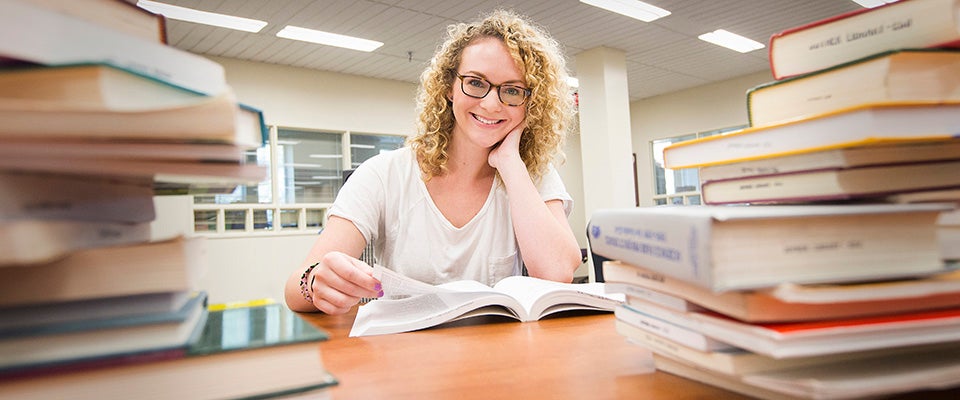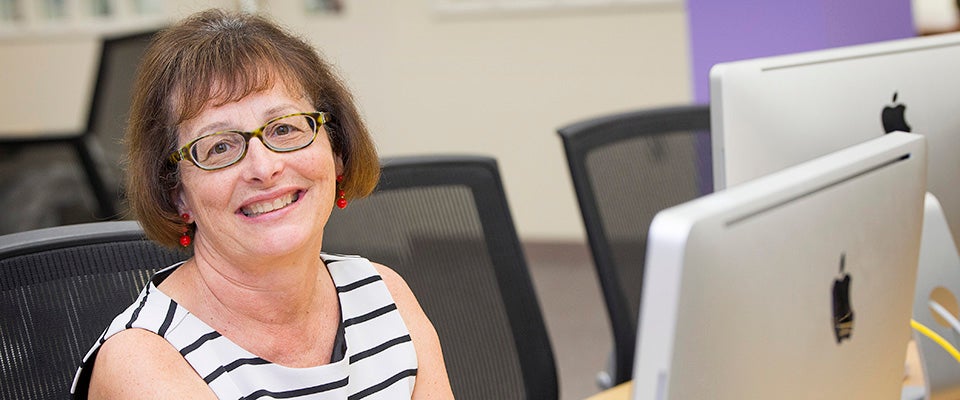REDUCING BARRIERS
Joyner Library's alternative textbook program benefits faculty and students
Participating faculty for the Fall 2016 semester are:
- Teal Darkenwald, associate professor, Department of Theatre and Dance
- Carol Goodwillie, associate professor, Department of Biology
- Lisa Maag, teaching assistant professor, Department of Psychology
- James McKernan, professor, Department of Special Education, Foundations, & Research
- Karen A. Mulcahy, teaching associate professor, Department of Geography, Planning, & Environment
- Margaret O’Hara, associate professor, Department of Management Information Systems
- Erol Ozan, associate professor, Department of Technology Systems
- Randall Parker, professor, Department of Economics
- Kennetta Hammond Perry, associate professor, Department of History
- Tracy Tuten, professor, Department of Marketing & Supply Chain Management
- Jennifer M. Valko, associate professor, Department of Foreign Languages & Literatures
- Cecelia Valrie, associate professor, Department of Psychology
- Jeffrey D. Wilhelm, instructor, Department of History
- Joseph G.L. Lee, assistant professor, Department of Health Education and Promotion
- Christyn Dolbier, associate professor, Department of Psychology
An alternative textbook program launched by J.Y. Joyner Library this year has the potential to save East Carolina University students hundreds of dollars each semester, and faculty members are eager to propose cost-saving solutions.
The program encourages faculty to explore alternative texts such as Open Access textbooks, freely-available articles and books, or library-licensed resources in lieu of assigning traditional textbooks.
Joyner Library Director Janice S. Lewis said faculty members across the university recognize that the high cost of textbooks is a barrier to student success and they wanted to do something about it.
“I think we have a responsibility to first-generation and low-income college students to reduce barriers to getting the knowledge needed to succeed,” said Dr. Joseph G.L. Lee, assistant professor in the Department of Health Education and Promotion.
The average cost of books and supplies for ECU undergraduate students is $1,260 per year. That mirrors the average costs nationwide, according to the Digest of Education Statistics.
Students shared with Lewis that they simply did not purchase course materials because of the cost, particularly for courses outside their major. Instead, they shared a book with a classmate or relied on their class notes and materials their instructor shared via PowerPoints or through Blackboard.
Only select faculty are able to participate at this time, but the response for proposals was so positive that Lewis said they’ll expand the program from 10 to 15 faculty when it begins this fall. Proposals included adopting existing open textbooks, incorporating library subscription resources such as journal articles, e-book chapters and streaming video in courses, and creating completely new content.
In many cases, faculty are also frustrated by the inability to find a textbook that adequately covers the subject matter they are teaching, and they are excited about the possibility of customizing content.
“I am interested in this program to enable more students to afford to attend college by reducing cost,” said Dr. Christyn Dolbier, associate professor in the Department of Psychology. “The program addresses issues I have with the traditional textbooks I’ve used and reduces reliance on publisher-provided learning activities. It will also allow me to pursue my scholarly interest in investigating ways to enhance student learning.”
Several proposals touted other advantages of alternative textbooks such as engaging students in active learning and ensuring that every student has access to course materials on the first day of class.
Margaret Blythe, a junior in the Department of Sociology, said she thinks students will benefit from the program.
“I particularly love using e-books because of their easy access,” she said. “They allow you to highlight important things and then later track and compile them for notes.”
“The fact that alternative textbooks also help students cut down on spending is fantastic,” she added.
“I am convinced that in many instances, alternative textbooks can provide higher quality content that is more timely and relevant for students than the texts currently being used,” said Lewis. “Through the program, Joyner Library can support faculty in their efforts to improve course materials and can help save students money on textbooks at the same time.”
Faculty in the program receive a $1000 stipend to compensate for additional time spent developing new course materials and assignments. They will also be paired with a librarian who will assist with identifying potential course materials and offer copyright guidance.
Current recipients are from the Thomas Harriot College of Arts & Sciences, the College of Business, the College of Education, the College of Engineering and Technology, the College of Fine Arts and Communication, and the College of Health and Human Performance.
The alternative textbook program is funded by library donors and income from the Fred Timms Langford and Verona Lee Joyner Langford Endowment Fund.
For more information, contact the Joyner Library scholarly communication department at scholarlycomm@ecu.edu or 252-328-2261.

Student Margaret Blythe, a junior in the Department of Sociology, likes the easy, online access of alternative textbooks and the cost savings associated with the program.
